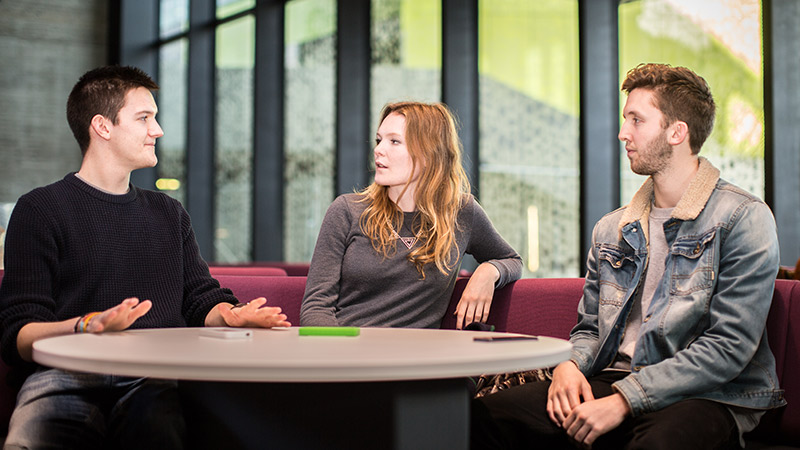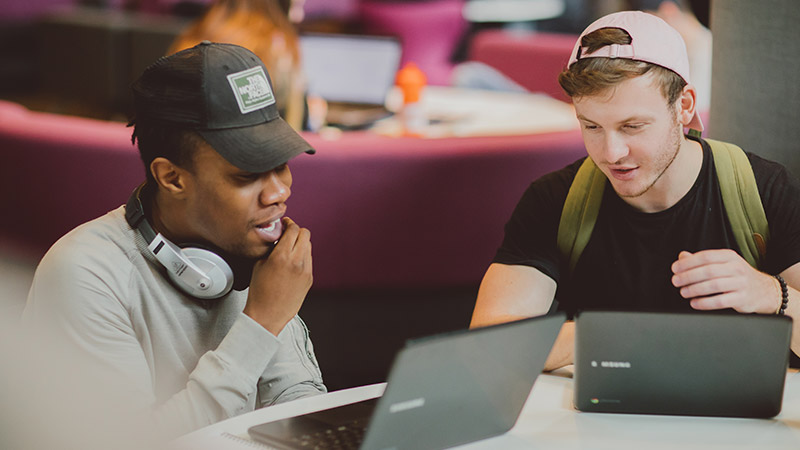Foundation in Humanities
Foundation course
UCAS code: L111
Start dates: September 2024 / September 2025
Full time: 1 year
Part time: 2 years
Location: Headington, Harcourt Hill
Department(s): School of Law and Social Sciences, School of Education, Humanities and Languages
Overview
Keen to study a humanities subject but not sure about your options? Join our 1-year course to explore and get the skills you need to continue to a degree.
Learning how to research, evaluate and communicate is a key part of your studies. How does literacy influence cultures? Are nations created by law and governance, or habits and customs? What can philosophies and religions teach us about being human? These are some of the big questions you’ll explore.
You’ll study 8 modules, including compulsory modules such as Nation and Identity, and optional modules you can choose from, including Global Issues and Eastern Religious Philosophies. You’ll learn from leading academics and discover the most recent developments in areas from history to literature.
You’ll learn through lectures, tutorials, workshops, and independent study – with no exams. Academic staff teach across the humanities, meaning you’ll benefit from a range of research-rich knowledge. And you can expect a sense of community, dedicated support, and detailed feedback on your work throughout the year.

Why Oxford Brookes University?
-
Freedom to explore
Get to know your preferences and explore the differences between various humanities subjects before choosing which subject to study for your degree.
-
Say goodbye to exams
Don’t get on with exams? No problem. You’ll be assessed through coursework such as individual and group presentations, critical commentaries and reflective journals.
-
Tailor your modules
Pick modules that interest you and study alongside undergraduates. Starting to have more of an interest in history, criminology, or social sciences? The choice is yours!
-
A breadth of expertise
Benefit from being taught by a wide range of expert academics. With tutors spanning the range of humanities subjects, your studies will be diverse and research-rich.
-
Shape your own research
Research the area of humanities you’re most passionate about. Create, manage and complete your own project while getting 1-to-1 guidance from an academic supervisor.
-
Free language courses
Free language courses are available to full-time undergraduate and postgraduate students on many of our courses, and can be taken as a credit on some courses.
Course details
Study modules
Please note: As our courses are reviewed regularly as part of our quality assurance framework, the modules you can choose from may vary from those shown here. The structure of the course may also mean some modules are not available to you.
Careers
The Foundation in Humanities course opens up further courses for you and prepares you for degree-level study.
After successfully completing the course, you’ll be guaranteed a place on one of our 3-year undergraduate degree courses in humanities or social sciences. You could choose a subject like criminology, philosophy, international relations, or history.
You’ll build skills that are directly relevant to university-level study, like critical thinking, independent study, research management and communication. And you’ll have access to our careers services, co-curricular activities, and peer mentoring schemes to boost your skills and awareness further. A future in a humanities-based career is waiting.
Entry requirements
Wherever possible we make our conditional offers using the UCAS Tariff. The combination of A-level grades listed here would be just one way of achieving the UCAS Tariff points for this course.
Standard offer
UCAS Tariff Points: 72
A Level: DDD
IB Points: 24
BTEC: MMP
Further offer details
Applications are welcomed from candidates with alternative qualifications, and from mature students.
Specific entry requirements
Please also see the University's general entry requirements.
English language requirements
Applicants whose main language is not English should have IELTS 6.0.
Please also see the University's standard English language requirements.
English requirements for visas
If you need a student visa to enter the UK you will need to meet the UK Visas and Immigration minimum language requirements as well as the University's requirements. Find out more about English language requirements.
Credit transfer
Many of our courses consider applications for entry part-way through the course for students who have credit from previous learning or relevant professional experience.
Find out more about transferring to Brookes. If you'd like to talk through your options, please contact our Admissions team.
Terms and Conditions of Enrolment
When you accept our offer, you agree to the Terms and Conditions of Enrolment. You should therefore read those conditions before accepting the offer.
How to apply
Application process
Full time international applicants can also apply through UCAS
Tuition fees
Questions about fees?
Contact Student Finance on:
Tuition fees
Please note, tuition fees for Home students may increase in subsequent years both for new and continuing students in line with an inflationary amount determined by government. Oxford Brookes University intends to maintain its fees for new and returning Home students at the maximum permitted level.
Tuition fees for International students may increase in subsequent years both for new and continuing students.
The following factors will be taken into account by the University when it is setting the annual fees: inflationary measures such as the retail price indices, projected increases in University costs, changes in the level of funding received from Government sources, admissions statistics and access considerations including the availability of student support.
How and when to pay
Tuition fee instalments for the semester are due by the Monday of week 1 of each semester. Students are not liable for full fees for that semester if they leave before week 4. If the leaving date is after week 4, full fees for the semester are payable.
- For information on payment methods please see our Make a Payment page.
- For information about refunds please visit our Refund policy page
Additional costs
Please be aware that some courses will involve some additional costs that are not covered by your fees. Specific additional costs for this course are detailed below.
Compulsory costs
| Additional costs | Amount (£) |
|---|---|
| Disclosure Barring Service (DBS) initial check (if you undertake specific modules or placements in some providers) | £54 |
Optional costs
| Additional costs | Amount (£) |
|---|---|
It’s your responsibility to cover print / binding costs where coursework submission is required. Please note that a lot of the coursework is now submitted online. |
From £30 |
| You may choose to purchase books to support your studies. Many books on our reading lists are available via the Library, or can be purchased secondhand. | £20-60 per book |
Accommodation fees in Brookes Letting (most do not include bills) |
£94-265 per week |
Accommodation fees in university halls (bills included, excluding laundry costs) |
£122-180 per week |
Graduation costs include tickets, gowning and photography. Gowns are not compulsory but typically students do hire robes, starting at £41. |
Typically £0-200 |
Students are responsible for their own travel to and from university for classes. BrookesBus travel is subsidised for full-time undergraduate students that are on a course with a fee of £9,250 or more, or living in an Oxford Brookes hall of residence. There is an administration fee for the production of a BrookesKey. |
From £10 |
Funding your studies
Financial support and scholarships
Featured funding opportunities available for this course.
All financial support and scholarships
Programme changes:
On rare occasions we may need to make changes to our course programmes after they have been
published on the website. For more information, please visit our
changes to programmes page.

